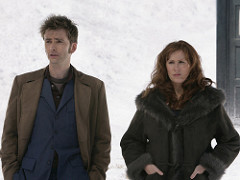 You can learn a lot about storytelling from Doctor Who.
You can learn a lot about storytelling from Doctor Who.
Specifically, the 2005 reboot onward. Both good things – and bad things. I just finished watching season four, and though I’d been planning a post something like this for a while, I’ve just got to get this bit out now. Spoilers for season 4 come after the recommendations. And, um, some profanity shows up in that section as well.
So first, recommendations. There are some bloody kick-ass episodes; these are my favorites from the first four seasons. Interestingly, each of these is a contained story; while they figure into “continuity”, they don’t require much backstory besides “The Doctor and companion(s) travel through time and space in this box and keep running into problems.”
- S01E10/S01E11 – “The Empty Child” & “The Doctor Dances”. Scary, brilliant, funny, and introducing Captain Jack Harkness.
- S02E10 – “Love and Monsters” – A delightful and moving balance of silliness and emotion. I might never listen to ELO the same way again. Also, told from outside the POV of the Doctor or a companion.
- S03E10 – “Blink” – I swear, I’m not picking the tenth episode of each season on purpose. Quite creepy, and yet touching. Again, told from the POV of someone outside the Doctor’s normal travels.
- S04E08/S04E09 – “Silence in the Library” & “Forest of the Dead”. There is so much character development here, and such a tight, well-written story that it’s just fabulous.
Sure, there’s other good episodes, but if you only have six hours and want to know why I love the show, there’s your reasons above. Study the techniques used to convey tension (and relieve it), the ways that character development is done quickly and well. Learn the good things to do.
Right, spoilers ahead.
Any second now…
Right. What are my least favorite episodes?
Every season endcap written by Russell T. Davies.
Oh, yes. That’s all of them through season four.
Yes, Doctor Who is full of deus ex machina. But for two (or three, depending on how you count it) episodes, Davies shoves it into our faces. When Davies hits an emotional note right – usually between supporting characters – it’s done damn well, but the rest of the time… well, I’m reminded of someone thinking they’re clever, and having to point out how clever they are being. “Oh, look, I brought back a villain from before! Aren’t I clever?” “Oh, look, a villain’s shown up again! Recurrence is the same as plot progression, right?”
But I could have forgiven it. I really could have. “Midnight” wasn’t bad at all. And for all the cheesy tropes pulled out in “Turn Left”, Catherine Tate really frickin’ nails the performance of Donna Noble. Sure, I’d always liked Donna since “The Runaway Bride”, but this episode just completely nailed it. She’d become my favorite (modern) companion.
 And then, Russell T. Davies, you had to fucking cheat your audience.
And then, Russell T. Davies, you had to fucking cheat your audience.
This isn’t a “Oh, how could you do this to my favorite character” screed. Oh, fuck no. Yes, I gasped in shock when Wash died in Serenity. It hurt… but it was damn good storytelling. Hell, for all the overwrought music and Billie Piper kind of overdoing it in “Doomsday”, I still shed some tears. It was tragic.
But really, none of that compares to “The Stolen Earth” and “Journey’s End”. Hey, we’d done the “people of the Earth appeal en masse to the Doctor” schtick (clap for Tinkerbell, kiddies) at the end of Season Three – so let’s do it again. And we did the “companion melds with something in the Tardis and it’s bad for them” schtick at the end of Season One, so let’s do it again.. And while we’re at it, let’s do an end-run around the entire sacrifice made at the end of Season Two.
Oh yeah, and then once we’ve seen Donna Noble grow and mature, to become “brilliant” and really believe she is, she is cheated of the entire experience. Oh, and her family’s gotta be on the plot too. And if anyone tries to end-run around this, it’ll kill her. Oh, the Doctor can bloody well suck “The Heart of the Tardis” (near-infinite power) out of Rose Tyler, but he can’t just pull part of his “Time Lord mind” out of Donna’s head so she doesn’t die?
Fucking really?
It’s a cheat. It’s a cheat for the audience – sloppy writing and explicitly reusing old plot elements. It invalidates all of the character growth Donna had, that was evidenced so strongly in “Turn Left”. It is NOT a sacrifice – because she does not choose it. That would have been tragic, if she’d actually had to choose forgetting. Or if she’d been killed – that would have been tragic.
Instead, she gets set back to (apparently) even more shallow and annoying than she was when we met her. After spending an entire episode showing us both how much Donna meant to the world and how much she’d changed and actualized her own potential, it was stripped away by a deus ex machina.
And that does nothing but piss off your audience.
As a writer, don’t do that. Kill your characters, be mean to your characters. Do that left and right, and while your readers may not love you for it, the character’s struggle and sacrifice will mean something… and be memorable.
Suddenly erase all the growth and change your characters have undergone, and your audience will be wondering why they bothered watching or reading your work in the first place.
